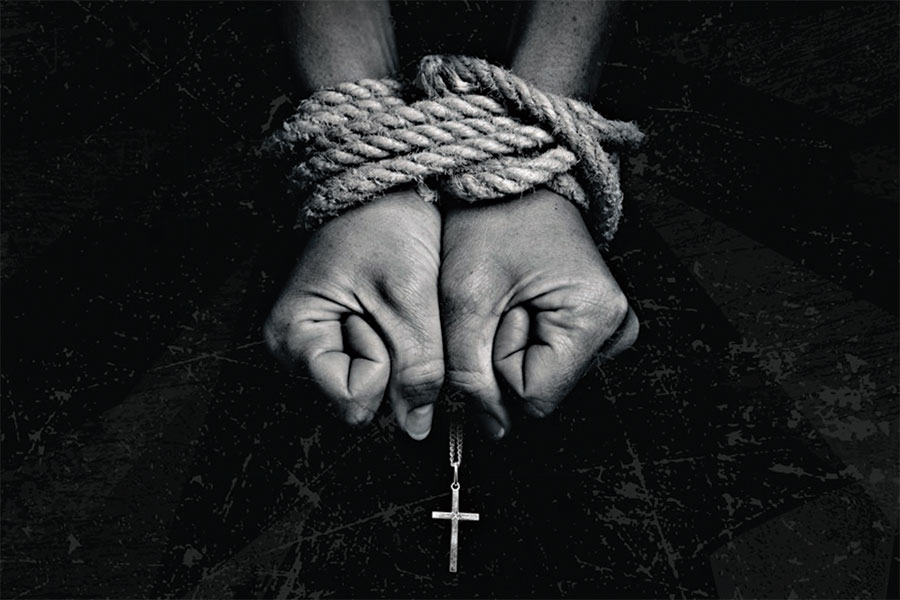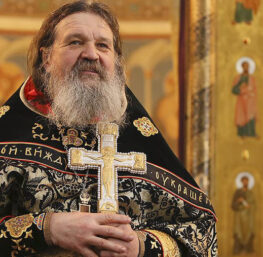 by Fr. John Moses –
by Fr. John Moses –
This time persecution will come under the banner of equality, uniqueness, and freedom.
If you were born in America, or if you have been here for a while, you will eventually hear about what is called “the American idea.” I recently heard Bono, the lead singer of the group U2, speak about this. The American idea holds that we are all equal, and each person is unique. Each person has the freedom to pursue life, liberty, and happiness. Bono said that it is a gift not just for Americans, but for the world.
Well, the times they are a changin’. This American idea has evolved into the idea that the right of self-expression is now the highest American virtue, and it trumps all other rights. The right to assembly no longer means that I can meet with people who share a common interest. All must be allowed to join whatever they wish to join, regardless of what the group or organization stands for. This is now impacting Christian colleges and universities who must include those whose lifestyle or belief is counter to traditional Christianity.
The time of comfortable Christianity is passing.
Curiously, in times of change, the power of conformity is great. We call it “political correctness.” To feel accepted, respected, and to avoid any kind of persecution, we will live no differently from others and speak no differently. Let me make a blanket statement (always dangerous): most of us live somewhere between the hope of being true to ourselves and conforming to the world. The time is near when we can no longer find a safe spot and compromise will mean leaving the Kingdom of God. The time of comfortable Christianity is passing.
For the Orthodox Christian, neither self-expression nor conformity to the world is the highest value. As St. Paul said, we are not to be conformed to the world, but transformed by Christ. To take on the image of Christ is to be hated by the world. So we might judge that because the world has not hated us, we have succumbed to the conforming power of the world.
We live in a time of exile.
There was a time when it seemed that Christianity and society had a more comfortable relationship. The culture seemed to reflect the values of the Church, and members of the Church felt that being a good citizen was their highest and best calling. Some wish we could go back to those times (even if such a state never really existed).
Let us hear from one voice:
“We live in a time of exile. At least those of us do who hold to traditional Christian beliefs. The strident rhetoric of scientism has made belief in the supernatural look ridiculous. The Pill, no-fault divorce, and now gay marriage have made traditional sexual ethics look outmoded at best and hateful at worst. The Western public square is no longer a place where Christians feel they belong with any degree of comfort.
For Christians in the United States, this is particularly disorienting. In Europe, Christianity was pushed to the margins over a couple of centuries—the tide of faith retreated “with tremulous cadence slow.” In America, the process seems to be happening much more rapidly.
It is also being driven by issues that few predicted would have such cultural force. It is surely an irony as unexpected as it is unwelcome that sex—that most private and intimate act—has become the most pressing public policy issue today. (Who could have imagined that policies concerning contraception and laws allowing same-sex marriage would present the most serious challenges to religious freedom?) We are indeed set for exile, though not an exile which pushes us to the geographical margins. It’s an exile to cultural irrelevance.”
~ Carl R. Trueman (A Church for Exiles)
I maintain that cultural irrelevance is not the end of things, but the beginning.
The Church has been in this situation before.
The Church has been in this situation before. Exile meant being moved from home and family. It meant persecution and death. We lived in a fantasy that such persecution would never come again. This time persecution will come under the banner of equality, uniqueness, and freedom. How do we survive this? Let me draw a few ideas from the history of the Church which not only survived, but converted the world around her. These strategies have always been true, but in exile they are more urgent.
1. Community
In exile, it is vital that we draw closer together in community. This doesn’t mean that we close our doors to the world or move to Montana. It means that it is the Church, and not our circle of friends, family or work, from which we will draw our strength and protection. We will need our Orthodox brothers and sisters, priests and hierarchs to draw closer together in love and mutual support. The Sunday Liturgy is an expression of our community, but once a week is not enough for those in exile. The fellowship that we will share in these meetings will be vital. We must abandon the American myth that we are all self-sufficient individuals and can do just fine on our own. This is the way the early church survived dark times of exile.
our spiritual life must be our number one priority
2. Liturgy
In exile, infrequent communion and poor attendance will not be enough to face what is coming. More than ever, our spiritual life must be our number one priority, above work and family and all else. We will need strength to be able to witness to our family, to train our children so that they can understand why they face ridicule for being a traditional Christian. We may want to rethink our abandonment of worship on Saturday night. The Church has a liturgical schedule that can counterbalance the rhythm of the world.
3. Study
Since this exile is in part ideological, we must know how to respond. We must be sure that we know the teachings of the Church and how they are to be applied. The truth will set us free, but if we are ignorant of the truth, the world will easily ensnare us. We must study or die.
if you love the world, the love of the Father isn’t in you
4. Prayer
The Saints in exile displayed incredible courage and commitment to the Lord. They were men and women of prayer. In work and in all of life, they had communion with God. When community, Liturgy, and study were taken away, it was prayer that sustained them. If the voice of the prophet is being heard again, and our exile is near or already here, then it is time that we commune with God until life becomes prayer and prayer is life. We must be ready, and we will be ready if we are people of prayer. After all, it is spiritual warfare and must be fought spiritually.
We are entering a time that we thought would never return. I know it may be hard to believe. We have always believed that the freedoms guaranteed in our Constitution would protect us. Now those freedoms are being used against us. Whether you compromise with this society or not will depend on your allegiance to Christ and the Holy Orthodox Faith. As the Apostle said, if you love the world, the love of the Father isn’t in you.
HT: Pravmir





Interesting how the sexual revolution freed mankind from inhibition, with so many becoming sex offenders who bought into that hype.
For the first time in all its history The Church shut its doors. Incomprehensible… NEVER would the Bishops EVER have done this.. ever. It makes me mad, it makes me grieve, it’s unconscionable!
So HOW do we fight and survive with the church doors closed??
How do have a community where no community exists? I don’t mean there is no Orthodox parishes, but no community. Many find themselves now in a place where we must travel, some an hour , some two hours, some four hours to a parish, even with multiple parishes in the local area.
Moving must be an option, but many are finding an uncomfortable situation when they arrive.
Amazing. Love to see it 🔥✝️